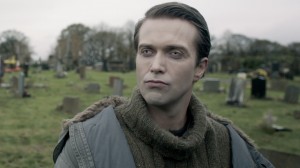 Previously I’ve commented on the interesting program airing on the BBC/BBC America, In the Flesh, which represents a thought provoking subgenre of the zombie narrative. One of the areas of interest to TheoFantastique is the incorporation of a religious element. In this case it’s an eschatological aspect, of sorts, wherein a group of Partial Deceased Syndrome sufferers come to believe that they are not pariahs to be feared as the living tend to view them. Instead, the Undead Prophet who leads the Undead Liberation Army, and who has a group of twelve disciples, teaches that those with PDS are the redeemed, destined for something special.
Previously I’ve commented on the interesting program airing on the BBC/BBC America, In the Flesh, which represents a thought provoking subgenre of the zombie narrative. One of the areas of interest to TheoFantastique is the incorporation of a religious element. In this case it’s an eschatological aspect, of sorts, wherein a group of Partial Deceased Syndrome sufferers come to believe that they are not pariahs to be feared as the living tend to view them. Instead, the Undead Prophet who leads the Undead Liberation Army, and who has a group of twelve disciples, teaches that those with PDS are the redeemed, destined for something special.
In Season 2, Episode 3, Simon Monroe, one of the Twelve, provided a bit of a tease on the theological foundation for such views. Simon (a name echoing that of one of Jesus’ closest disciples), sits while quoting from the New Testament to himself. He recites and modifies a text from Revelation 1:18 – “we were dead, and behold, we are alive forevermore, and have the keys of death and of Hades.” The interesting thing about this quotation and application is that in its original context is comes from the resurrected Christ to an individual and for communication to a specific group of Christians. With the reworking from In the Flesh we are not told how the original context relates to the application which is in the plural to PDS individuals rather than singularly to Christ.
Several aspects of this eschatology (doctrine of “last things”) are unclear in the series. The Undead Prophet has sent Simon to recruit new disciples (who in this episode performed a baptism-like ritual with a wet rag used to remove makeup that makes PDS individuals look like the living, revealing the true self underneath, a kind of rebirth), but to what end? Viewers have also heard of a future “second rising” that some of the religiously devout living look forward to. But this second rising seems to be in conflict with the PDS individuals coming back from the dead, so viewers are left with conflicting conceptions of the “resurrection.” Is this a play on the New Testament’s idea of the resurrection of the just and the unjust?
It will be interesting to watch how these theological elements are developed and come together over the rest of Season 2. For those who enjoy thought provoking commentary on social and religious phenomena in their zombie entertainment, In the Flesh is a rewarding experience.





There are no responses yet